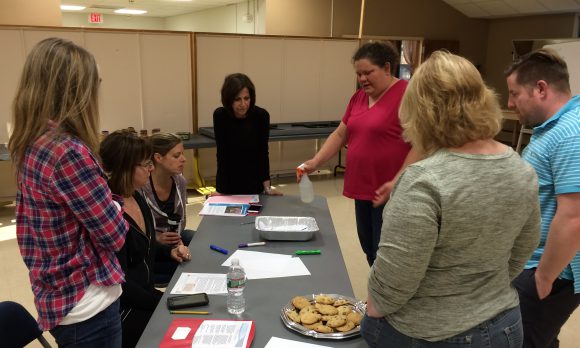
Tamara Pellien, 4-H Agent with Ocean County, demonstrates a watershed model activity for educators as part of the Water Engineers Program Photo credit: Steve Yergeau.
Educating students in the STEM disciplines (science, technology, engineering and mathematics) has become a focus of schools across the country. This is mainly due to the need for a well-prepared future workforce, as the growth of STEM-related jobs from 2000 – 2010 rose at a rate three times faster than non-STEM-related employment. Many educators conduct instruction targeted in the STEM areas to fulfill this need, but through the use of the same conventional model in education: lecture, memorize, and test. For years, educators have discussed and attempted to address STEM in the context of real-world, applied science. In trying to implement a hands-on approach to learning, educators continue to face challenges: a lack of learning opportunities and limited funds to allow for project-based learning. These factors hinder the ability of educators and youth to put their new understanding of STEM to effective use. Ocean County’s 4-H and environmental resource agents are collaborating to meet the challenges of teaching students the STEM disciplines in new and innovative ways. This partnership has resulted in the creation of two programs: the Water Engineers Program and Growing with Vertical Gardens Program.
The Water Engineers Program is designed to develop teaching and learning tools for educators to teach youth about stormwater pollution and provide guidance on implementing service projects that reflect best practices in dealing with this pollution in Ocean County. The objective is to engage students in a hands-on learning experience that will help to reduce water use or water pollution from their schools. For the Growing with Vertical Gardens Program, a unique partnership across Rutgers Cooperative Extension Departments (Agricultural & Resource Management Agents, 4-H Youth Development, and NJ Supplemental Nutrition Assistance Program-Education) in Ocean County is being used to implement horticulture and nutrition education program to youth in schools. These schools face a decreasing amount of green spaces for growing produce that could supplement traditional education efforts, and the objective of the Growing with Vertical Gardens Program is to assist schools by bringing upright vegetable gardens into the classroom and providing hands-on educational opportunities on horticulture and healthy eating.
The approach to both of these programs is two-fold:
Provide instruction to educators: First, educators learn how to lead project-based activities in water quality and watershed management for the Water Engineers Program, or horticulture and/or nutrition for the Growing with Vertical Gardens Program. These activities focus on the issues of that particular program’s content through hands-on education activities and also what resources are available for dealing with those issues.
Engage students through service learning: Educators then lead these activities for youth in their respective classes. Armed with this knowledge, youth will then implement a service project selected from a series of provided learning opportunities that will directly impact water quality/conservation as part of the Water Engineers Program, or a classroom vertical garden for the Growing with Vertical Gardens Program.
Thus far, a two-part teacher workshop was conducted for seven educators from six schools in March, 2016 for the Water Engineers Program. These seven educators were provided with the materials and curricula for a watershed model activity and information on several options for the hands-on service learning. Part of the program includes a small amount of funding for implementing the service learning at the educators’ schools. Rutgers Cooperative Extension faculty in Ocean County are working closely and providing technical support with three of the schools to design native plant pollinator gardens and to build and install rain barrels to be used to water the gardens. The remaining schools are in the planning phase of their service projects, which include a possible rain garden and additional native plant gardens that will reduce the use of water for landscaping. With the Growing with Vertical Gardens Program, two schools in Lakewood have been identified, and planning is moving forward among staff for implementation in the fall of 2016.
By involving educators and students in active STEM education on issues at hand in Ocean County, they become invested in the future sustainability of local resources. Helping the diverse population in Ocean County adapt to a changing landscape while improving their lives with an educational and action-oriented process that uses science-based knowledge to improve their health and well-being, as well as meeting the curriculum needs of educators, can only be met through collaboration and the sharing of expertise. When the expertise of faculty and staff is valuable to the communities they serve, partnering to leverage resources is proving both efficient and effective in the implementation of programs in Ocean County. For further information on this project, contact Steve Yergeau, Environmental and Resource Management Agent – Ocean & Atlantic Counties at yergeau@njaes.rutgers.edu or (732) 505-3671.
Funding for both of these projects was provided by the Phillip Alampi Fund and the authors gratefully acknowledge their support.
Written by Steven E. Yergeau, environmental & resource management agent, Ocean & Atlantic Counties and Tamara Pellien, 4-H agent, Ocean County. Reprinted from Green Knight newsletter, May 2016.

